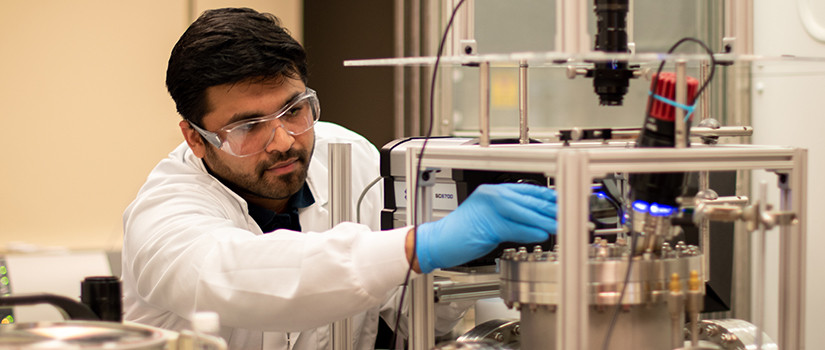Sobhan Patnaik, a fourth-year doctoral candidate in the College of Engineering and Computing’s nuclear engineering program, has received the Roy G. Post Foundation Scholarship Award for his research on cracking of nuclear fuel pellets under transient temperature conditions. He hopes this work will result in improved safety and economics surrounding nuclear fuels.
The Roy G. Post Foundation Scholarship Award is for $5,000 and is given to graduate and undergraduate students all over the world who are leaders in the field of nuclear energy and the proper use of nuclear power. The goal of the scholarship program is to help students develop careers in the safe management of nuclear materials. Patnaik’s award was presented virtually on March 10 during the Foundation’s annual Waste Management Symposium.
A Ph.D. is not easy. I’ve had my ups and downs when I didn’t know how to move forward. But research is a team effort.
- Sobhan Patnaik, Ph.D. candidate in nuclear engineering
Patnaik is studying nuclear fuel pellets in various conditions in order to predict their behavior in the reactor when under irradiation, high temperature and mechanical stress. The goals of his research are to improve safety in accident situations involving nuclear reactors, as well as to advance the design of nuclear fuels with longer life spans and greater sustainability.
In order to simulate accident conditions and collect data, Patnaik built a test rig where he can apply resistive heating and thermal and optical imaging to a fuel pellet in order to measure temperature gradients and obtain pictures of the cracks occurring in situ.
Patnaik said, “I’m looking at the mechanical fracture and the temperature that drives the fracture and recording both simultaneously. I want to find what thermal conditions induce enough stresses in the fuel pellet resulting in crack initiation and propagation.”
The data he collects will be used by the Idaho National Laboratory to validate computational cracking models using fuel performance codes such as BISON. Patnaik’s test rig is the first of its kind, and he has a patent pending on the device. He said, “It’s significant that this testing has never been done before. I’m happy to be contributing to the larger nuclear community.”
Travis Knight, nuclear engineering program director and Patnaik’s advisor, said, “While Sobhan’s research has implications for reactor safety, the greatest impact is in the design of fuels so they operate longer and under a wider range of conditions to improve economics. Longer life fuel also promotes greater sustainability for a source of power that is already green, with lower carbon emissions than most renewables.”
Patnaik attributes his success in the nuclear engineering program to support from Knight and other students. He said, “A Ph.D. is not easy. I’ve had my ups and downs when I didn’t know how to move forward. But research is a team effort. Dr. Knight has been a great mentor, always offering a solution, and I will be forever grateful to him. I’ve also had a lot of support from my fellow graduate students.”
As evidenced by both student and graduate success, the CEC's nuclear engineering program is preparing students to be leaders in this field of study. Knight said, “The nuclear engineering program prepares students for careers in industry, government, national labs and academia. Many graduates now work in areas of nuclear fuels and materials, nuclear safeguards and security and nuclear facility operations, with a number of them working on new reactors, small modular reactors and next generation designs."
Patnaik is also a recipient of the American Nuclear Society’s 2019 James F. Schumer Scholarship. Upon graduating, he plans to continue working in research and development of advanced nuclear fuels, particularly the manufacturing of accident-tolerant fuels. He said, “I’m an experimental person. I want to be in a lab and study the fuels firsthand. I plan to dedicate my efforts to improving nuclear fuels in any way I can.”
